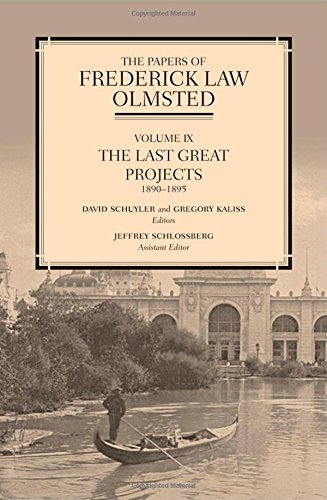Frederick Law Olmsted: Plans and Views of Public Parks (The Papers of Frederick Law Olmsted)




In 1890, Frederick Law Olmsted, then nearly sixty-eight years old, had risen to the pinnacle of his career. Together with his partners, stepson John Charles Olmsted and protégé Henry Sargent Codman, he was involved in a number of major ongoing projects, including the Boston, Buffalo, and Rochester park systems, the campus plan for Stanford University, and numerous private estates. In July, he reported that the firm had "twenty works of considerable importance" underway, including nine large parks and six estates that he believed were "matters of public interest." Before the summer ended, the firm’s commitments would expand dramatically as Olmsted and his partners were appointed landscape architects for the World’s Columbian Exposition in Chicago. As commissions for new park systems, residential communities, grounds for educational institutions, and private homes increased, Olmsted feared that their commitments would exceed the partners’ ability to do their best work.
Despite these fears, Olmsted’s work in the final six years of his professional career would only enhance his considerable reputation, as the ninth and final volume of The Papers of Frederick Law Olmsted reveals. With its impressive waterways, monumental buildings, and verdant islands and shores, the Chicago fair proved to be one of the firm’s crowning achievements. The early 1890s also saw the culmination of Olmsted’s wide-ranging work on one of his other great projects: the design of the grounds of George W. Vanderbilt’s massive estate, Biltmore, near Asheville, North Carolina. In planning the estate’s thousands of acres, Olmsted outlined new approaches to landscape design, promoted the creation of the first scientific forestry operation in the United States, designed a model residential subdivision, and proposed an arboretum that would have been the most ambitious in the nation.
The Last Great Projects, 1890–1895, chronicles the history of one of the world’s greatest landscape design firms while offering a fascinating retrospective on Frederick Law Olmsted’s productive final years. The volume also gathers together the important documents of this last triumphant era. As Olmsted neared the end of his career, he wrote some of his most reflective letters and reports, summarizing the legacy of his involvement with the U.S. Sanitary Commission, the quality of landscape design in England and France, the biographical circumstances that proved most important to his development as an artist, and his hopes and fears for the future of his profession.
| Country | USA |
| Author | Frederick Law Olmsted |
| Binding | Hardcover |
| Brand | Olmsted, Frederick Law/ Schuyler, David (EDT)/ Kaliss, Gregory (EDT)/ Schlossberg, Jeffrey (EDT) |
| EAN | 9781421416038 |
| Edition | 1 |
| ISBN | 1421416034 |
| Label | Johns Hopkins University Press |
| Manufacturer | Johns Hopkins University Press |
| NumberOfItems | 1 |
| NumberOfPages | 1104 |
| PublicationDate | 2015-01-20 |
| Publisher | Johns Hopkins University Press |
| Studio | Johns Hopkins University Press |
| ReleaseDate | 0000-00-00 |